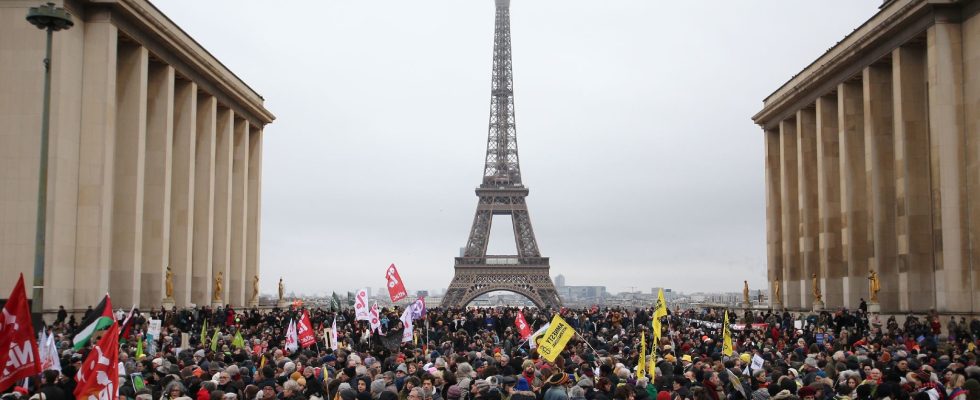Final pressure on the executive: four days before a highly anticipated decision from the Constitutional Council, between 75,000 (according to the authorities) and 150,000 people (according to the CGT) demonstrated this Sunday, January 21 against the promulgation of the “immigration” law. The 160 marches organized throughout France, including that of Paris between Trocadéro and Les Invalides, responded to the call initially launched by 201 personalities against this text voted in mid-December with, in particular, the voices of the National Rally.
“This law is a break with French principles since 1789 for land rights and since 1945 for the universality of social protection,” explained the general secretary of the CGT, Sophie Binet, who called for mobilization with her CFDT counterpart, Marylise Léon. Several left-wing leaders, Manon Aubry (LFI), Marine Tondelier (Ecologists), Olivier Faure (PS) and Fabien Roussel (PCF) castigated an executive “which opened the drawbridge to the ideas of the extreme right”, according to the first secretary of the PS.
In the Parisian demonstration, Mady Cissé, a 59-year-old Senegalese, temporary worker in the building industry, appreciated “significant support” but “also logical”. “We form one and the same society: without us, the country would not function, we are the ones who get up at 5 a.m. to go to work in the building, to take out your trash… Even the prefecture offices which refuse us the papers, we are the ones who clean them!” observed the worker, who has a temporary residence permit.
“Drifting towards the far right”
The authors of the call to demonstrate, including many personalities from the world of culture such as actresses Josiane Balasko and writer Alice Zeniter, are asking Emmanuel Macron not to promulgate the law. “This law is a drift towards the extreme right, politically, and basically towards national preference,” observed former RPR minister and ex-Defender of Rights Jacques Toubon.
In question, the numerous additions by Parliament to the government’s initial text, giving a very right-wing color to a law which was initially to be based on two components, one repressive for “delinquent” foreigners, the other promoting integration. The text now includes many controversial measures, such as tightening access to social benefits, establishing migration quotas, or reinstating the “crime of illegal residence”.
“The immigration law risks having extremely serious consequences, particularly in Marseille,” said Fathi Bouaroua, former regional director of the Abbé Pierre association, in the Marseille city. “There are many of them working in our restaurants or businesses and are such a part of daily life that it is unacceptable not to have them among us.”
Questioned on Sunday in the program “Political Questions” (France Inter, FranceinfoTV and Le Monde), the Minister for Gender Equality Aurore Bergé denied that the text establishes “national preference” by referring to its opponents responsibility for the rise of the RN, which is currently leading the polls for the future European elections.
“Instilling the idea that we are taking up the theses and themes of the national gathering, there, for sure, we are giving them an ideological victory,” she declared. On BFMTV, the president of Reconquête, Eric Zemmour denounced a “harmful law for the French”, promising to stop all “legal immigration”.
